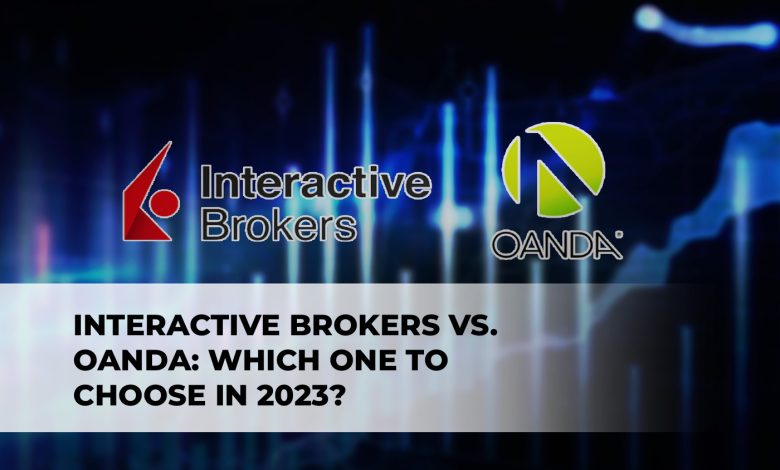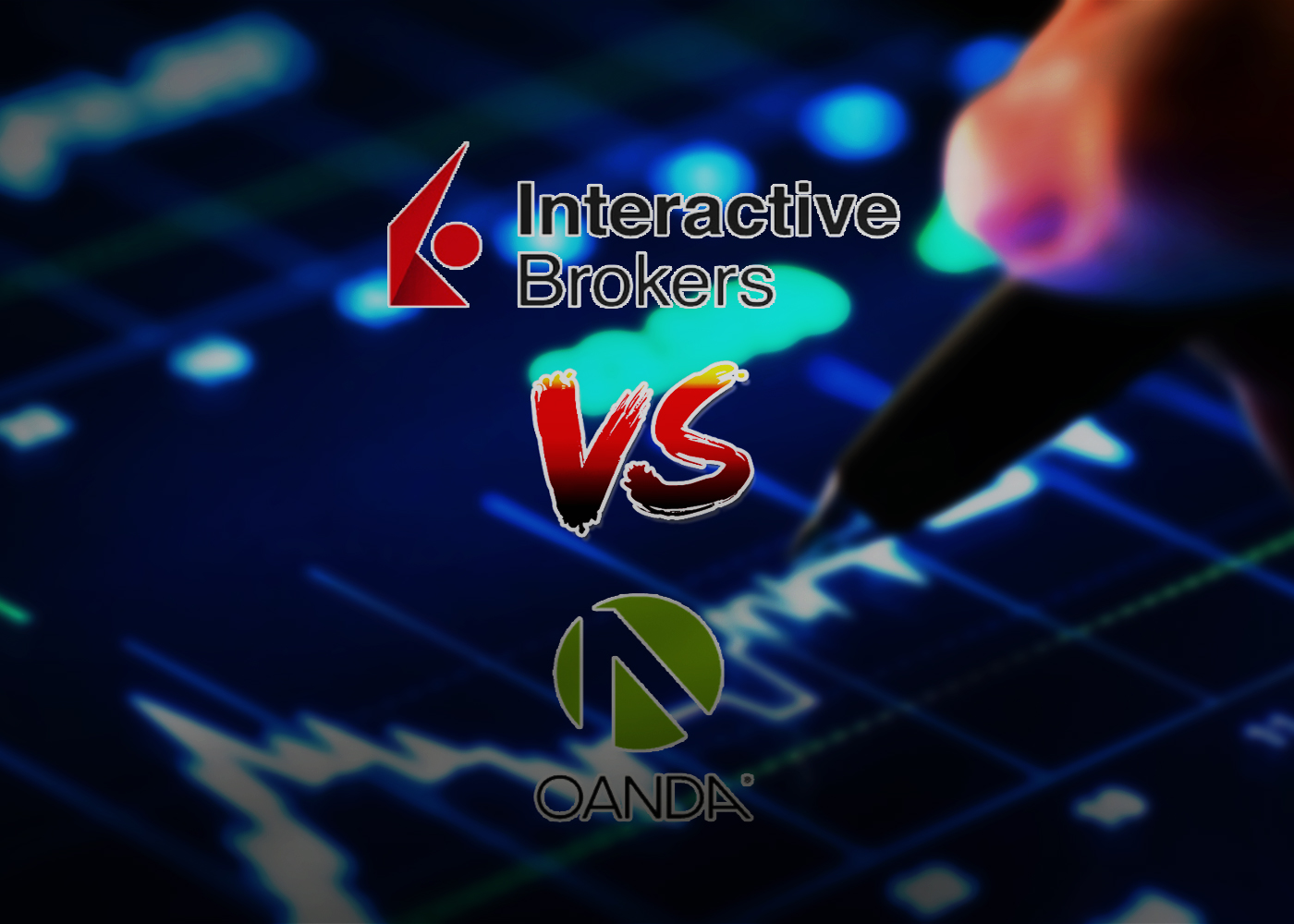
When it comes to trading or investing online, a reliable online brokerage is crucial. Choosing the right platform for your trading can be difficult for beginners because of the many options available today. To help you make a better selection, we will compare and contrast two of the better-known online brokers, InteractiveBrokers and OANDA. We will discuss their features, pricing, user interface, and customer support. Let’s get straight into it.
Interactive Brokers vs. OANDA: An Overview
Our first broker is Interactive Brokers, which is a popular online brokerage platform that enables traders from all around the world to access various tools and platforms for trading. Stocks, options, futures, bonds, and foreign exchange are some of the assets that the platform provides. It comes to the fore with low-cost trading and a huge inventory of markets.
The other platform that we will talk about is OANDA, which is a popular forex broker that helps people trade commodities, currency pairs, indexes, and bonds. Founded in 1996, this company has been providing customers with reliable trading services all around the world. The platform is well known for its useful tools that are perfect for newbies and seasoned traders alike.
Unique Features:
Both Interactive Brokers and OANDA have some unique features that set them apart from other online brokers:
Interactive Brokers:
- Fractional Shares Trading: Interactive Brokers allows fractional shares trading that allows traders to trade smaller portions of shares. This can be useful for investors who want to invest in more expensive stocks or diversify their portfolios with smaller investments, as it allows trading without whole shares.
- IBKR Lite: This broker offers a simpler version of its platform, IKBR Lite, which is a commission-free trading platform for US stocks and ETFs. Additionally, the platform has no account minimums or maintenance fees. No wonder it is so accessible for new investors and those with smaller portfolios.
- Global Execution: Through Interactive Brokers, people can directly access over 135 markets in 33 countries. That allows people to trade in different time zones. Additionally, the platform accepts many different currencies, so international traders can easily trade on this platform.
OANDA:
- Advanced Charting: OANDA offers advanced charting tools, which include over 70 technical indicators and drawing tools. This allows traders to analyze more and make better trading decisions.
- Autochartist Autchartist, OANDA’s technical analysis tool, scans the market for potential opportunities and wars traders when it detects specific chart patterns. This is a useful feature because people can see potential opportunities better and act accordingly.
- Economic Calendar: OANDA’s economic calendar helps by giving information on important events and announcements that can be crucial for the finance world. This feature can be customized based on the trader’s time zone and personal preferences.
Overall, these unique features can be valuable for traders and investors, depending on their individual trading styles and preferences.
Key Differences Between Interactive Brokers and OANDA:
Compared to OANDA, Interactive Brokers has the following important distinctions:
Asset Groups:
When compared to OANDA, Interactive Brokers offers a wider variety of asset classes. The first platform mainly focuses on forex trading, but it also allows people to trade commodities, indices, and bonds. On the other hand, Interactive Brokers offers a huge range of asset classes like stocks, options, futures, and many others.
Trading Platforms:
Regarding trading platforms, Interactive Brokers offers a couple of platforms like Trader Workstation, IBKR Mobile, and IBKR WebTrader. OANDA, on the other hand, provides two main platforms for trading: OANDA trade, which is a web-based platform, and the downloadable MT4. Both offer a diverse range of features and tools, but many people agree that Interactive Brokers’ are better and more diverse.

Pricing:
The pricing of these two brokers is a crucial factor in choosing the right one for you. Interactive Brokers offers some of the lowest fees in the business. Yet, it has some additional fees, such as inactivity fees. Whereas OANDA does not demand any inactivity fees and minimum deposit requirements.
Customer Service:
When it comes to customer service, both platforms are top-notch. You can access it via phone, email, and live chat. On the other hand, Interactive Brokers might seem less approachable for newbies as the platform is known for its complexity. It is not the case in OANDA due to the extensive library of learning materials provided by the platform.
Which Is Better for You? Let’s Help You Decide:
Both platforms offer specialized tools and resources that might come in handy for many people. Here’s a quick overview of both Interactive Brokers and OANDA that could help you decide which is better for your needs:
-
- Forex Trading: OANDA might be better for forex trading with its trading platform, competitive pricing, and in-depth technical analysis tools.
- Access to Global Markets: Interactive Brokers might be a little bit better if you want to access global markets, as it allows people to access over 135 markets in 33 countries. On top of that, multi-currency support is a big plus.
- Low-Cost Trading: If you’re trying to save money on trading, your best bet is Interactive Brokers, with its low fees. Yet, there might be additional fees and charges involved. OANDA’s prices are also fairly competitive, and there are no additional fees like inactivity fees and minimum deposit requirements involved.
- Beginner-Friendly: With its intuitive trading interfaces, a wealth of teaching materials, and zero minimum deposit, OANDA is a great option for novice traders.
- Advanced Trading: With its sophisticated order types and access to various trading APIs, Interactive Brokers may be the best option for the experienced trader searching for cutting-edge trading tools and platforms.
The final decision between Interactive Brokers and OANDA should be based on your individual trading requirements and preferences. It’s important to weigh the benefits of each platform against your trading objectives and methods before settling on one.
Final Verdict:
Finally, both Interactive Brokers and OANDA are trustworthy online brokers with numerous trading options and platforms. One platform may be better suited to a trader’s needs than the other, despite their shared features (such as competitive pricing and a large selection of asset classes). OANDA may be the preferable option for inexperienced or forex-focused traders, while experienced traders or those interested in accessing international markets may do better with Interactive Brokers. To choose the ideal platform for your individual trading demands and preferences, conducting a thorough assessment of both is essential.
You may be interested in:
Group Income Protection Explained: What You Need to Know
DAO Coin Weekly Analysis And Price Prediction
Cons of Hiring a Tax Professional: Why Is It Not Always a Good Idea? [2023]







